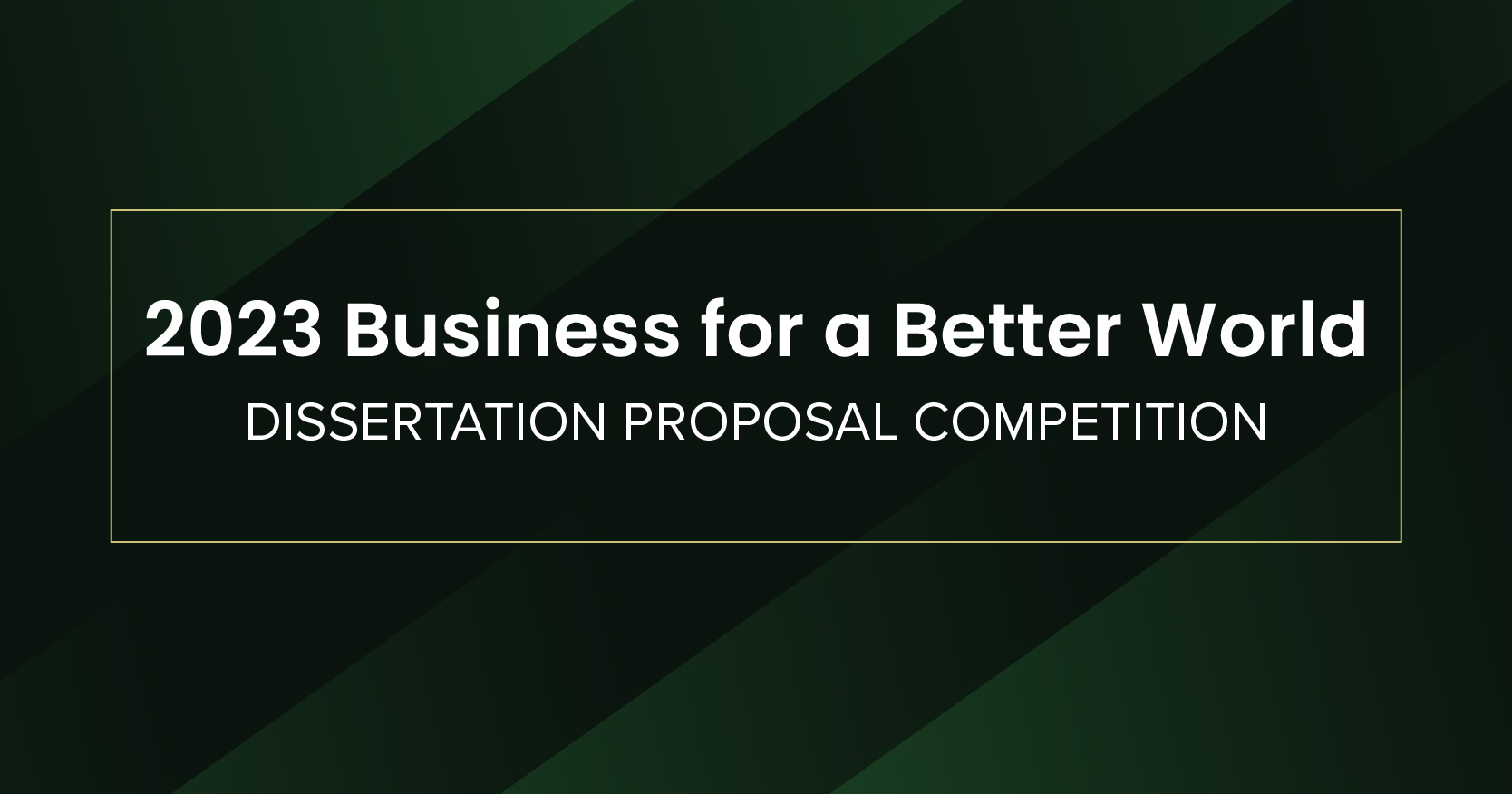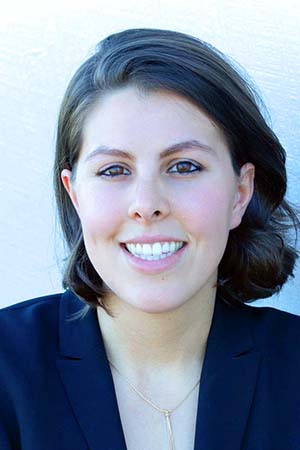
Colorado State University’s College of Business is proud to announce the winners of the third annual Business for a Better World Dissertation Proposal Competition. The authors of the winning proposals will each receive $6,000 to support their research.
The winning proposals span a wide range of topics and research methods. Noting that religious beliefs may influence how patients utilize preventative healthcare, Yafei Guo of the University of Illinois at Urbana-Champaign studies ways to align healthcare marketing with patients’ beliefs. Ekonkar Kaur of the Michael G. Foster School of Business at the University of Washington investigates how the shift to remote work influences depression in hope of better understanding how to design interventions. Youjeong Song of the Carlson School of Management at University of Minnesota examines how nonnative speakers communicate in their workplaces.
Although the disciplines and methods of research vary among winners, each winner is positioned to drive positive societal changes through their research.
“The College of Business is committed to supporting researchers who share our vision that business can transform our world for the better,” said senior associate dean for faculty and research Ken Manning. “All three proposals have great potential to help address pressing societal challenges that have traditionally not been at the forefront of business research.”
In addition to the research funding, the scholars will to present their research at the 2023 Business for a Better World Research Symposium held Oct. 6.
“We want to engage the religious population more in their preventative healthcare – that’s a big issue in the current world – and as a marketing scholar, I want to provide some marketing tools that could potentially tailor to different religious populations.”

Preventative healthcare services such as such as annual checkups, regular screenings or vaccines can dramatically improve patients’ health and reduce treatment costs associated with more advanced conditions, but millions of people in the United States don’t use them.
A marketing strategy that successfully encourages people to access preventative healthcare could have enormous personal and financial impacts – and Yafei Guo believes that a person’s religious beliefs could influence the type of messaging to which they’re most likely to respond.
Guo theorizes that people who believe in a punitive god – an authoritarian entity that oversees human behavior – are more likely to engage in preventative healthcare when marketing materials show what they will lose by not doing so. The marketing strategy for this group would be to emphasize the risk or long-term harm that could come from not accessing preventative care.
Alternatively, people who believe in a benevolent god – a loving entity that provides support and protection – are more likely to seek preventative care when they’re shown what they will gain by doing so, he says. This group could be persuaded by messaging that highlights the benefits of preventative care.
Guo used data from a study across 73 countries that examined how gain-framed or loss-framed messaging influenced people’s willingness to comply with COVID-19 safety measures, then compared it to data showing whether people in each country were more likely to believe in heaven or in hell.
“I found that the gain-framed message is more effective for countries that have a higher percentage of people who believe in heaven, and loss framing message is more effective for countries with a higher population who believe in hell,” he said. To further test his theory, he proposed three studies that would examine preventative health behaviors related to COVID-19, skin cancer and mental health, as well as a field study.
While the COVID-19 pandemic served as an example of the high stakes when it comes to preventative healthcare measures such as vaccines, Guo is also interested in encouraging routine healthcare behaviors such as checkups or screenings, which are shockingly underutilized.
“We do need a lot of new strategies, especially from a marketing perspective, for healthcare providers and policymakers to engage people more in preventative healthcare,” Guo said.
Guo, who was born and raised in China, was drawn to this research in part because of his upbringing: His parents are Buddhist, but his grandparents are Christian.
“They celebrate in different times, they have different traditions and also, when I got sick when I was a child, my parents and my grandparents had different ways to solve the issue,” he said.
Ever since, he’s been intrigued by how different beliefs influence people’s decision making.
He was especially interested to learn that 81% of people in the United States say they believe in God – and that many make everyday decisions through the lens of their religious beliefs. To encourage preventative healthcare among religious groups, he realized, marketers would need to take the beliefs of their audience into account.
“You need to make it connected and cater to their personal beliefs and make them believe this is relevant to their behavior,” he said.
Since the COVID-19 pandemic, there’s been a historic shift in the workplace environment. Those who previously worked five days a week in an office found themselves working fully remote. While the change in job arrangements affects the physical work space, it’s the effect on mental health that is most impactful.
Ekonkar Kaur was six months into her PhD program at the University of Washington studying organizational behavior when the pandemic hit, forcing everyone to work from home. Kaur was interested in workplace psychology, but it wasn’t until the quarnatine that she began to observe how remote work was impacting mental health.
“I noticed a certain kind of commentary, both publicly on the news as well as in my social circles about how virtual and remote work might be impacting people’s mental health,” Kaur said. “That kind of got me inspired to learn a little bit more.”
Kaur began to research the relatively young but highly relevant topic. She found a particular interest in how the shift toward remote work was going to impact those with more serious mental health challenges like depression. Eventually this research led to the topic of her dissertation.
In her study, Kaur seeks to examine the extent to which virtual work impacts depression. She explores intrapersonal and interpersonal processes to understand how depression impacts how we work. That is, the relationship or process one has with themselves versus with others. In this scenario, a person and their colleagues.
In some of her pilot survey studies, she noticed that those who are dealing with depression may believe that they are better able to cope with their feelings and emotions in a virtual setting. However, working remotely can deprive individuals of important social interactions and relationships, particularly with coworkers.
Kaur hopes that the research she conducts will positively impact organizations and their policies regarding remote work and those experiencing depression. “If an organization has employees who are dealing with depression during a certain time period, being able to rely on research about work arrangements that support these employees could be helpful,” she said.
Looking specifically from a research standpoint, Kaur is excited to examine this topic from an interdisciplinary perspective. “One of my committee members has more clinical experience whereas my direct advisors are within the business school,” she said. “I’m excited to bring insights from both the clinical field as well as the management research field and create something that is beneficial to both areas of research and leverages insights from the two worlds.”
Effective communication is a foundation of successful teams. Language barriers present challenges for teams with non-native speakers working in environments as diverse as corporate offices of globalized companies and unskilled migrant labor. While language is central to effective team performance in all settings, many questions about how multilingual teams function remain.
Youjeong Song focuses on three issues related to these language barriers that may help managers guide teams and improve the work experiences of non-native speakers. In the first, she examines how and why multilingual workers bridge language gaps in the workplace. Noting that these de facto translators may assume the role of intermediary for a variety of reasons, such as altruism toward colleagues, for the benefit of their organization or to cultivate a strategic advantage for themselves, management literature has few investigations of this process or how it plays out.
“We don’t know why they do that and what are the experiences that they have as a result of their helpful behaviors,” Song said. “Knowing why they do that would enable us to encourage them to engage in such behaviors if we believe that those behaviors are beneficial for organizations.”
Song expands her focus in her second direction of study, which looks at multilingual teams that adopt a company-wide common tongue. While employees may share basic proficiency in their shared language, some face additional hurdles when communicating, such as interpreting slang, understanding idioms or bridging cultural subtexts. Song hopes her work to define and measure these challenges bring change to the workplace.
“Many studies are talking about these language barriers, but we don’t know what a language barrier is exactly because there is no precise definition of it and we don’t have a measure for it,” Song said.
In her final area of interest, Song shifts from corporate settings to examine the experience of low-skilled immigrant workers in the United States. Although sociologists and other researchers have examined the impacts of language barriers on this population, her discipline has largely overlooked it. Often with few resources to translate information into their native tongue, these workers struggle with a situation researchers term information marginalization. In this position, essential information about their workplace, job functions and larger place in the economy are unavailable in their language.
Song’s interest in language barriers stems from her exposure to a variety of ideas while working on her doctorate. She began another project about lookism with a member of faculty in the first year of her program, which sparked an interest in diversity topics. Later, she assisted a project that concentrated on language diversity in global teams. Those two concepts naturally fit together, and Song began work investigating how language barriers impact some of the most vulnerable workers. Ultimately, she hopes her insights drive tangible change for those workers.
“I believe a published article is one way we can say that there is evidence,” Song said. “We can say, ‘This is not just my thought, there is evidence, and if you do this then you can actually help these people.’”
About CSU’s College of Business
The College of Business at Colorado State University is focused on using business to create a better world.
As an AACSB-accredited business school, the College is among the top five percent of business colleges worldwide, providing programs and career support services to more than 2,500 undergraduate and 1,300 graduate students. Faculty help students across our top-ranked on-campus and online programs develop the knowledge, skills and values to navigate a rapidly evolving business world and address global challenges with sustainable business solutions. Our students are known for their creativity, work ethic and resilience—resulting in an undergraduate job offer and placement rate of over 90% within 90 days of graduation.
The College’s highly ranked programs include its Online MBA, which has been ranked the No. 1 program in Colorado by U.S. News and World Report for six years running and achieved No. 16 for employability worldwide from QS Quacquarelli Symonds. The College’s Impact MBA is also ranked by Corporate Knights as a Top 20 “Better World MBA” worldwide.

